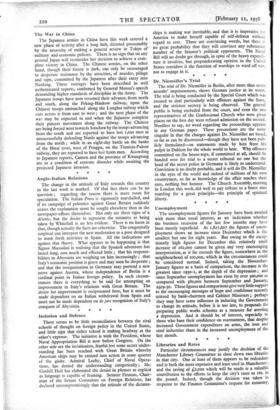The War in China The Japanese armies in China have
this week entered a new phase of activity after a long halt, dictated presumably by the necessity of making a general review in Tokyo of military and economic policies. There is no sign that on any ground Japan will reconsider her decision to achieve a com- plete victory in China. The Chinese armies, on the other hand, though their future is dark, can only be encouraged to desperate resistance by the atrocities, of murder, pillage and rape, committed by the Japanese after their entry into Nanking. These outrages have been described in well authenticated reports, confirmed by General Matsui's speech demanding higher standards of discipline in the Army. The Japanese troops have now resumed their advance, from north and south, along the Peking-Hankow railway, upon the Chinese troops entrenched along the Lunghai railway which cuts across it from east to west ; and the next phase of the war may be expected to end when the Japanese complete their pincers movement along the railway. The Chinese are being forced west towards Soochow by the troops advancing from the south and are reported to have lost 1,000 men in unsuccessfully defending Nanlo against the troops advancing from the north ; while in an eight-day battle on the banks of the Hwai river, west of Pengpu, on the Tientsin-Pukow railway, they are reported to have lost 8,000 men. According to Japanese reports, Canton and the province of Kwangtung are in a condition of extreme disorder while awaiting the projected Japanese invasion.


















































 Previous page
Previous page